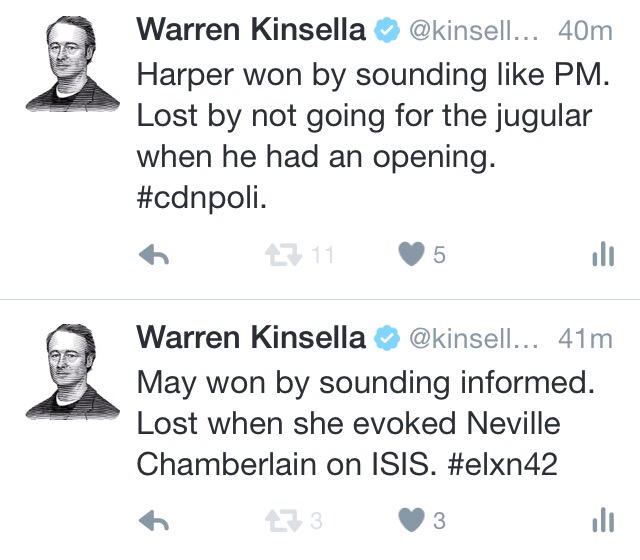KCCCC Day 10: if a debate fell in the forest, and no one was around to see it, would it matter?

[From this week’s Hill Times.]
The first debate has come and gone, and was seen by all the hacks in the land. Every politico was glued to their armchairs, watching Stephen, Thomas, Justin, and Elizabeth duke it out – and, occasionally, switching channels to take in some of the Republican presidential freak show.
But real folks? Joe and Jane Frontporch, as we call them?
They mostly didn’t watch.
As William L. Benoit wrote in his seminal book, Communication in Political Campaigns, “although millions continue to tune into debates, the number of voters – and the percentage of voters – who watch them has decreased over time.” And, as a CBC reporter asked prior to Thursday’s debate: “Will anyone watch an entire debate, or, will voters just see clips promoted in their Facebook feed?”
The answer, increasingly, is that many voters don’t watch leaders’ debates or presidential debates, at all. Mostly, this happens because debates provide fodder for the widely-held view that (a) politicians are badly behaved and (b) politicians would rather attack each other than come up with good ideas.
In 2000, I personally experienced this phenomenon close-up. I was on CTV with (the sadly, now-departed) Canadian Alliance spokesman, Rod Love, providing colour commentary. Rod was saying his guy was winning, and I was saying mine was, naturally.
The CTV host – disgraced broadcaster Mike Duffy, ironically enough – disagreed. He told us this: “Nobody is winning. My producers are telling me we are losing viewers in droves. They can’t stand all the shouting.”
Similarly, last Thursday night’s debate could have been noisier than Motorhead playing in a teacherless elementary school cafeteria at lunch time, and with about as much dignity, too. But it wasn’t too bad.
As in 2000, all the prime ministerial aspirants periodically shouted over each other – and they particularly sought to shout down Prime Minister Harper. It was not always pretty.
As such, Harper was the likely winner. He didn’t score any goals, per se, but he didn’t let the puck in the net very often, either. When three professional politicians are doing their utmost to take you into the boards, that’s about all you can hope for.
(Elizabeth May was well on her way to winning the debate – until the end, that is, when she shredded her own credibility on fighting terrorism.)
The objective, in any TV debate, is simple. It is twofold.
One, you need to look and sound prime ministerial – or, as the case may be, presidential. TV is a visual medium, and voters feel that debates give them an opportunity to evaluate a candidate by simply watching him or her. Thus, John F. Kennedy won in 1960, because he was calm, cool and handsome. His opponent, Richard M. Nixon, lost because he looked jowly and angry – and because he had a sweaty brow.
The second objective is equally simple: use the debate to ratify your campaign’s issues with those who are tuning in. As such, a leader should never be looking for the illusory “defining moment” – those are mainly a false media construct.
Instead, the objective should be ensuring that your issues (for Harper, security and economy; for Mulcair, serious progressive change; for Trudeau, change that isn’t radical) dominate the proceedings.
Figuring out who won any debate is pretty simple: first, watch it with the sound off, to see who looks like the right person for the job being sought. Then, review it with the sound on, to see whose issues occupied the most time during the entirety of the debate. There’s your winner, folks.
Now, in the mendacious modern era, lots of folks will claim to have watched the debate – when, in fact, they only saw a clip or two on Twitter or the aforementioned Facebook. To these voters, that is about as much time as they are prepared to commit.
The Conservative Party, with well-funded communications techniques that always aim for the lowest common denominator, is the party that tends to be better at this stuff. They know that fewer and fewer folks are tuning in, and the main task is therefore simply getting citizens to think about what you are saying for a minute.
By those standards – and when you consider how Joe and Jane Frontporch are increasingly tuning out – Stephen Harper likely won the debate.
The others, meanwhile, looked like they were auditioning for the jobs they already had: opposition leaders.







